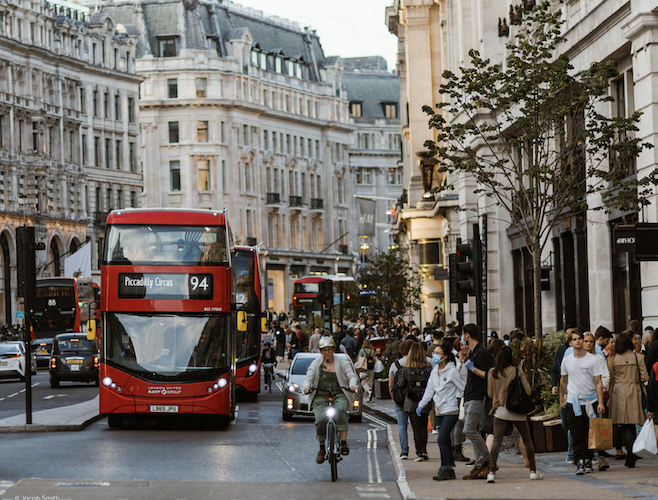National government should stop using “divisive ‘us and them’ rhetoric about London and the rest of the UK” and instead seek to reduce regional economic inequalities by increasing investment spending in all parts of the country rather than cutting funding to the capital, according to a new report about “levelling up” challenges.
In the second part of its exploration of the “levelling up” theme think tank Centre for London argues that “economic success is not a zero sum game” and that at a difficult time for the whole nation it is particularly important for London and other regions to work together towards “a more productive, more inclusive economy with higher growth”.
Focussing on London’s national contribution, the report – written by research director Claire Harding and colleagues Jon Tabbush and Millie Mitchell – records that the capital makes a major tax contribution to the rest of the country and that although it receives a lot of transport funding, “subsidy per ride” – as distinct from per head of population, a measure often used by others – is actually low.
However, the report, building on the first in the series, places particular stress on the need for advocates for London to find the right language and messages to use about the city in the context of “levelling up”, which was a centrepiece of the Conservatives’ 2019 general election manifesto.
Drawing on focus group research conducted in partnership with Savanta and Toynbee Hall, the report says “broad agreement within and outside London” emerged about what is good and what is bad about the city, with shared positive views about opportunity, diversity and London’s international importance, and shared negative ones about the cost of living and visiting and about crime and pollution.
Other findings included a lack of interest among non-Londoners about the capital’s tax contribution to their lives or the importance of its financial sector compared with its importance to the UK’s global standing and ability to attract visitors. There was a shared awareness of poverty in London, and some people felt that because many wealthy people live here, London itself should be responsible for solving the problem. The report thinks such views could be seen as “implicit support for devolution”.
In light of these insights the report recommends that London government bodies and others always seek to collaborate and learn from equivalent organisations elsewhere and, in public statements, try to eschew observations about competing with other regions for resources in favour of emphasising “connections and shared challenges” along with London’s diversity, cultural attractions and international status while placing relatively less weight on its financial roles.
The report documents that before the pandemic London generated a “net fiscal surplus” of £4,030 per head of population, meaning that on average each Londoner paid £4,030 more in tax to the government for spending elsewhere than was spent on each Londoner. “London does not absorb a disproportionate share of central national government funding,’ says the report, and adds that after Covid-19’s impacts have passed its tax surplus contribution to national finances will resume.
This economic success underlines the importance to “levelling up” of its continuation, the report says, arguing that “strengthening economies outside London makes sense, but weakening London does not” and highlighting the importance to this of government supporting low income workers in making their lives in the capital. It adds that “London is not an island” due to a huge network of business connections and supply chains creating networks of economic interdependency. “Any policy that penalises the capital will affect the wider economy in myriad ways,” the report concludes.
On culture and the arts the report makes the similar case that “Strengthening cultural institutions outside London makes sense, but undermining London’s own cultural offer does not”. The Arts Council, in line with government requirements, recently slashed funding for London institutions, including all support for English National Opera which might now have to move outside the capital. “It is impossible to separate the success of London’s cultural and artistic communities from the success of the city as a whole,” Centre for London maintains.
Other recommendations from the report include central government treating economic development as “growth-based rather than zero-sum”, maintaining London’s tax base, allowing London’s regional government to raise more money itself for infrastructure investment – as with the Elizabeth Line – and prioritising investment in skills.
Read the full report, entitled London’s Contribution in the UK here. Image taken from the report.
On London strives to provide more of the kind of journalism the capital city needs. Become a supporter for just £5 a month. You will even get things for your money. Details here.

